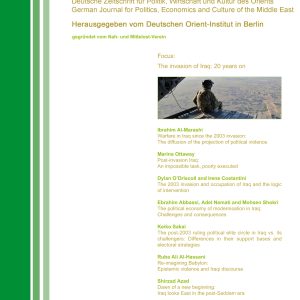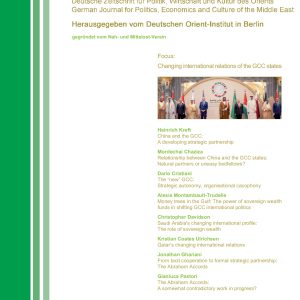Shop
Showing 97–112 of 323 resultsSorted by latest
-

Post-invasion Iraq: An impossible task, poorly executed
7,90 €incl. VAT
Add to basket -

The post-2003 ruling political elite circle in Iraq vs. its challengers: Differences in their support bases and electoral strategies
7,90 €incl. VAT
Add to basket -

The 2003 invasion and occupation of Iraq and the logic of intervention
7,90 €incl. VAT
Add to basket -

Orient III 2023: The invasion of Iraq: 20 years on
26,00 €incl. VAT
plus Shipping Costs
Select options This product has multiple variants. The options may be chosen on the product page -

Warfare in Iraq since the 2003 invasion: The diffusion of the projection of political violence
7,90 €incl. VAT
Add to basket -

The Abraham Accords: A somewhat contradictory work in progress?
7,90 €incl. VAT
Add to basket -

From tacit cooperation to formal strategic partnership: The Abraham Accords
7,90 €incl. VAT
Add to basket -

Qatar’s changing international relations
7,90 €incl. VAT
Add to basket -

Saudi Arabia’s changing international profile: The role of sovereign wealth
7,90 €incl. VAT
Add to basket -

Money trees in the Gulf: The power of sovereign wealth funds in shifting GCC international politics
7,90 €incl. VAT
Add to basket -

The “new” GCC: Strategic autonomy, organisational cacophony
7,90 €incl. VAT
Add to basket -

Relationship between China and the GCC states: Natural partners or uneasy bedfellows?
7,90 €incl. VAT
Add to basket -

China and the GCC: A developing strategic partnership
7,90 €incl. VAT
Add to basket -

Orient II 2023: Changing international relations of the GCC states
26,00 €incl. VAT
plus Shipping Costs
Select options This product has multiple variants. The options may be chosen on the product page -

Indonesia-GCC cooperation in climate action: Progress and ways forward
7,90 €incl. VAT
Add to basket -

Climate change impact and action: Qatar at the forefront
7,90 €incl. VAT
Add to basket



